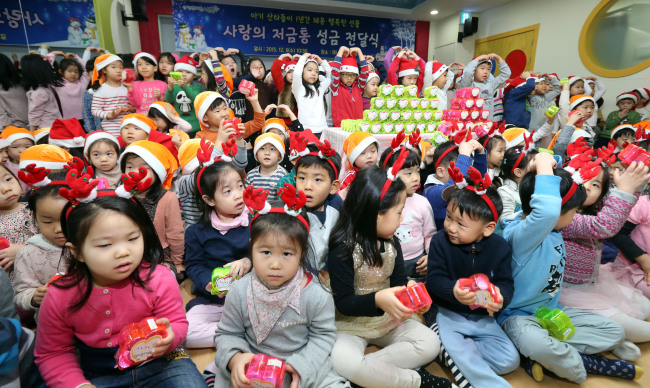The Education Ministry on Thursday threatened to file a lawsuit against municipal education offices that have been refusing to allocate their budget on next year’s child care allowance for children aged 3-5 with the claim that the central government must fully finance the program.
Backing the ministry’s stance, Choo Kyung-ho, head of the Office for Government Policy Coordination, also announced that the central government would take “every possible disciplinary measure” -- be it legal, administrative or financial -- to pressure the offices should they continuously refuse to cooperate.
“All education superintendents are legally obligated to finance the free child care program,” said Lee Young, vice minister of education, during a press conference on Thursday, strongly urging the education offices to finance the budget as soon as possible.

“We are not going to tolerate them shifting their responsibility on the central government by using innocent parents as their hostage.”
Among the 17 education offices nationwide, only 10 of them have set aside a budget for the “Nuri” subsidy program, which gives allowance that fully covers kindergarten and day care tuition fees for all children aged 3-5, albeit only for the first two months of 2016.
Among the remaining seven, Sejong City and Gangwon and North Jeolla provinces have partially funded the programs by allocating their budget for children who will be attending kindergartens, but not those at day care centers.
Four municipal education offices -- Seoul, Gwangju, and Gyeonggi and South Jeolla provinces -- have not set aside a budget for the program, meaning parents who live in those regions must start paying for their children’s kindergarten or day care costs starting January.
According to the regional education offices, the Nuri program requires some 2.1 trillion won ($1.9 billion) to implement nationwide next year.
The central government recently allocated 300 billion won to support the municipal offices to finance the program, but the education superintendents have stressed that they are still 1.8 trillion won short of making the allowance program possible for 2016.
Just a day before the press conference, a group of education superintendents, including the Seoul education chief Cho Hi-yeon, gathered to express their frustration, publicly requesting President Park Geun-hye to meet with them in person to discuss the matter.
Jang Huy-gook, superintendent of the Gwangju Metropolitan Office of Education, who also represents all education chiefs nationwide, argued that day care centers are child care institutions, not educational institutions, and therefore regional education offices are only responsible for supporting kindergarten costs.
“We have repeatedly told the central government that we are at least willing to finance the budget that is required for children who will be sent to kindergarten,” said Jang on Wednesday at the gathering in Seoul.
“But day care centers are being regulated by the Ministry of Welfare, not the Ministry of Education. We believe that day care centers are child care institutions, not educational institutions. Therefore we think it’s reasonable for the central government, precisely the Welfare Ministry, to finance the Nuri allowance for parents who send their kids to day care centers, while we finance the program for those who send their children to kindergarten. It’s absurd for the central government to ask us to finance 1.8 trillion won while they’ve only given us 300 billion won.”
The Education Ministry is not the only central government agency who is preparing a legal battle against municipal agencies.
The Welfare Ministry also announced Wednesday that it would file a lawsuit against the governments of Seoul and Seongnam City, Gyeonggi Province, claiming the regional governments went against the law by setting aside a budget for special allowance program -- a monthly subsidy of 500,000 won -- for young unemployed Koreans without “consulting” the central government.
Along with the Education Ministry, the Welfare Ministry also created controversy over its own child care subsidy program for infants aged 0-2 earlier this year.
In September, it announced that it will charge households with full-time stay-at-home mothers for the currently free day care service should they utilize it for more than seven hours daily starting July next year. The revision, which the ministry claimed was “to better support double-income households,” was criticized by critics who called it misogynistic and discriminatory.
By Claire Lee (dyc@hearldcorp.com)







![[Graphic News] More Koreans say they plan long-distance trips this year](http://res.heraldm.com/phpwas/restmb_idxmake.php?idx=644&simg=/content/image/2024/04/17/20240417050828_0.gif&u=)
![[KH Explains] Hyundai's full hybrid edge to pay off amid slow transition to pure EVs](http://res.heraldm.com/phpwas/restmb_idxmake.php?idx=644&simg=/content/image/2024/04/18/20240418050645_0.jpg&u=20240419100350)







![[KH Explains] Hyundai's full hybrid edge to pay off amid slow transition to pure EVs](http://res.heraldm.com/phpwas/restmb_idxmake.php?idx=652&simg=/content/image/2024/04/18/20240418050645_0.jpg&u=20240419100350)

![[Today’s K-pop] Illit drops debut single remix](http://res.heraldm.com/phpwas/restmb_idxmake.php?idx=642&simg=/content/image/2024/04/19/20240419050612_0.jpg&u=)